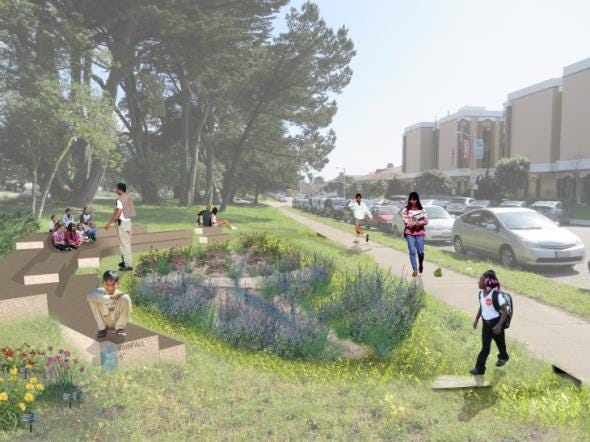San Francisco’s Green-Grey Infrastructure
Published on by Robert Brears, Founder of Our Future Water, Young Water Leaders, Mitidaption & Author (Springer Nature, Wiley) in Government
Over the next 20 years, San Francisco Public Utilities Commission (SFPUC) will spend around $2.7 billion upgrading its sewer system. Read how the city is ensuring it will be a mix of green and grey infrastructure.
By Robert C. Brears*
SFPUC’s Urban Water Assessment is part of the city’s Sewer System Improvement Program, the city’s 20-year program to plan, identify, and build investment priorities in the city’s sewer system. The Urban Watershed Assessment will shape the next generation of collection system projects (including the downspouts, streets, pipes, and green infrastructure elements that carry stormwater and sewage to the city’s treatment plants) by improving seismic reliability, managing stormwater, reducing odors, protecting water quality, and reducing flooding. Overall, addressing these challenges now is more cost-effective than deferring them to when the system fails and poses a critical threat to the city.
Integrating above and below ground solutions
Unlike traditional plans of the past, the Urban Water Assessment will integrate above- and below-ground solutions including permeable pavement and rain gardens as well as sewer pipes and pump stations, with the ultimate goal of ensuring green and grey strategies work together for future generations. The integrated green and grey strategies will provide the city with multiple benefits including helping protect the sewer system from earthquakes and sea level rise, attracting investment and jobs, as well as creating sustainable communities and beautiful neighborhoods.

San Francisco’s flagship green infrastructure projects
In total, SFPUC is constructing eight flagship green infrastructure projects, one in each of the city’s urban watersheds to test green technologies and evaluate their long-term effectiveness. The projects that set the stage for the city’s new way of managing its stormwater include:
· Mission Valencia Green Gateway , a completed project that created a new plaza area at the corner of Valencia and Mission streets that includes rain gardens and an infiltration gallery to capture and absorb stormwater before it enters the combined sewer system. The project also includes a raised cycle track and traffic calming bulb-outs to enhance safety for pedestrians and cyclists
· Sunset Boulevard Greenway , an ongoing project that will see green infrastructure extend over two miles of Sunset Boulevard. Rain gardens will be placed strategically along the western side of the street to significantly reduce the stormwater entering the sewer system and infiltrate stormwater into the soil to help replenish groundwater reserves. A Learning Lab will be designed to provide an educational setting on a variety of related subjects including stormwater and the hydrological cycle, conservation, ecology, biology, native plants, and other environmental topics
· Upper Yosemite Creek Daylighting Project , which will involve the daylighting of the upper-most portion of the Yosemite Creek. The project will feature rain gardens, infiltrative creek, subsurface storage, and a high-efficiency irrigation system that reuses stormwater.
The take-out
To be resilient to future challenges, infrastructure upgrades of the future will be a combination of green and grey solutions above- and below-ground.
*Robert C. Brears is the author of Urban Water Security (Wiley), The Green Economy and the Water-Energy-Food Nexus (Palgrave Macmillan), Natural Resource Management and the Circular Economy (Palgrave Macmillan), and Blue and Green Cities (Palgrave Macmillan). He is Founder of Our Future Water, Mitidaption, and Mark and Focus.
LinkedIn Groups: Our Future Water / Urban Water Security
Twitter: Mitidaption / YoungH20Leader / Our Future Water
Attached link
https://medium.com/mark-and-focus/san-franciscos-green-grey-infrastructure-9addcdc17903Media
Taxonomy
- Water
- Dewatering
- Groundwater
- Stormwater Management
- Watershed
- Freshwater
- Stormwater
- Infrastructure
- Integrated Infrastructure
- Storm Water Management
- Green Buildings
- Stormwater Runoff
- Infrastructure
- Water
- Green Technology
- Water
- green infrastructure
1 Comment
-
This movement to return water to its natural functions.Each hectare of such territories contains up to 20 tons of underground living creatures, each unit of which converts and evaporates moisture.Organic vapors created a modern climate.Must be used by all cities in the world.Artificial evaporation from arable land, asphalt, from production processes begin to exceed organic evaporation and affect the climate, create natural disasters, lead to a general catastrophe.
Это движение по возврату воде ее природных функций. Каждый гектар таких территорий содержит до 20 тонн подземной живности, каждая единица которой преобразовывает и испаряет влагу. Органические испарения создали современный климат. Необходимо применять всеми городами мира. Искусственные испарения от пашни, асфальта, из производственных процессов начинают превышать органические испарения и воздействуют на климат, создают стихийные бедствия, ведут к всеобщей катастрофе.
